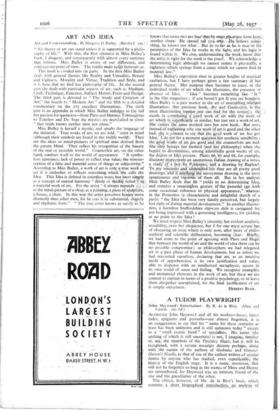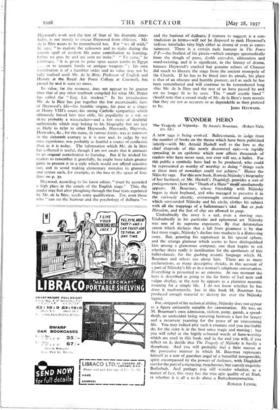A TUDOR PLAYWRIGHT linwin. tos. 6c1.) " , ALTHOUGH John
Heywood and all his workes—farces, inter- ludes, epigrams and proverbs—are almost forgotten, it is an exaggeration to say that his "name for three centuries at least has been Unknown and is still unknown today" except to a "small ascetic band" of specialists. His name (the spelling of which is still uncertain) is not, I imagine, fainiliar to, say, the members of the Pytchley Hunt, but it Will be recognised, with a certain nostalgic distaste perhaps, along with the names of the authors of Gorboduc and Ganinier Gurton's Needle, as that of one of the earliest writers of secular drama by anyone who has studied, even superfiFially, the history of the English stage. It is a name, moreover., that will not be forgotten so long as the names of More and Donne are remembered, for Heywood was an intimate friend of the one and the grandfather of the other.
The object,. however, of Mr. de la Bere's book, which contains-, a short biographical introduc-n.on„ an. analysis of Heywood's wqrk and the text of I four of his dramatic inter- ludes, is not merely to rescue Heywood from oblivion. Mr. de la- 136re wants to be remembered too. For "we all wish," he says., "to explore the unknown and to make during the narrow spell of modern life some contribution to learning, before we pass by and are seen no-mdre." "To some," he continues, " it is given to prise open secret tombs in Egypt . . . or to unearth fossils or antique' weapons " ; his own contribution is of a bumbler order and its value may not be fully realised until Mr. de la* Bete, Professor of English and History at the Royal Air Force College at Cranwell, has passed by and is seen no more.
Its value, for the moment, does not appear to be greater than that of any other Textbook compiled fur what Mr. Potter has called_ the " Eng. Lit. student." In his introduction Mr. de In B6re has put together the. few ascertainable facts of Heywood's life—his humble origins, -his post as a singer at Henry VHI's court,shis strong Catholic sympathies which ultimately forced him into ekile, his popularity as a wit, Or nipre probably a wisecracker—and a few more: of doubtful authenticity which may belong to his biography but are just as likely to. refer to other Heywoodi, Haywards, Ha3-wods, Heewodes, Sct., for the name, in various forms, was as common in the sh4eenth century as it is now and, to judge by my own experience, was probably as fruitful a source of confusion then as it is today. The information which Mr. de la Bere has collected is useful, though I am not aware that it amounts to an original contribution to learning. But if he wished his readers to remember it gratefully, he might have taken greater Pains to present it in a style which would not offend sensitive ears and to avoid making elementary mistakes in grammar and syntax suck, for example, as the two in the space of four lines on p. 39.
Heywood, according to his latest editor, "must be accorded a high place in the annals of the English stage." This, the reader may feel after ploughing through the four texts reprinted by Mr. de la Here, needs some qualification. For, even those who "can see the humour and the psychology of dullness "—
and the hunicati Of thinness; I 'enture to suggest, is a con- ttadiction' jn terms—will - not be disposed to rank Heywood's tedious interludes Very high either as drama oi even as enter- tainment. There is a certain rude humour in The Foure P.P.—the liveliest- of his pieces—Which emerges spasmodically from the slough of puns, double entendres, alliteration and word-twisting, and it is significant, in the history of drama, because Heywood's cracked but genuine echoes of Chaucer did much to liberate the stage from the ancient monopoly of the Church. If he has to be fitted into its annals, his place is that of an obscure and humble pioneer, ani as such he has been remembered and will continue to be remembered long after Mr. de la Bere and the rest of us have passed by and are no longer fit to be seen. The "small ascetic band" should note that a casual study of Mr. de la Here's texts reveals that they are not as accurate or as dependable as they_pretend







































 Previous page
Previous page